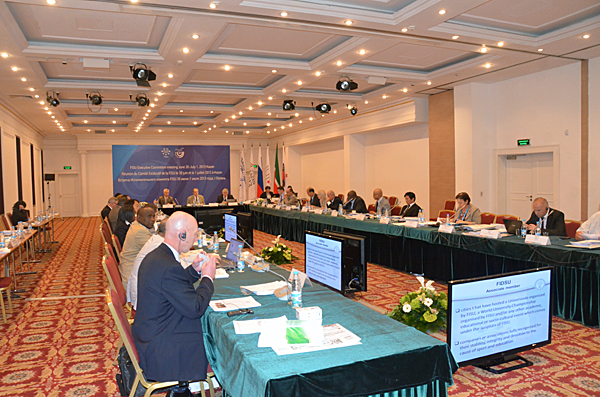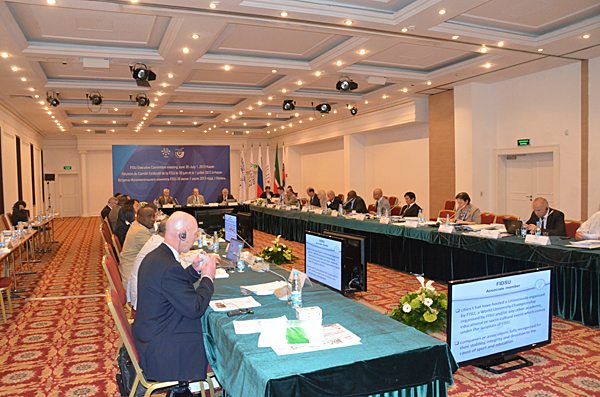
KAZAN – Today, June 30th, the FISU Executive Committee held its first day of meetings in Kazan, Russia, host city of the 27th Summer Universiade which is about to open in a few days.
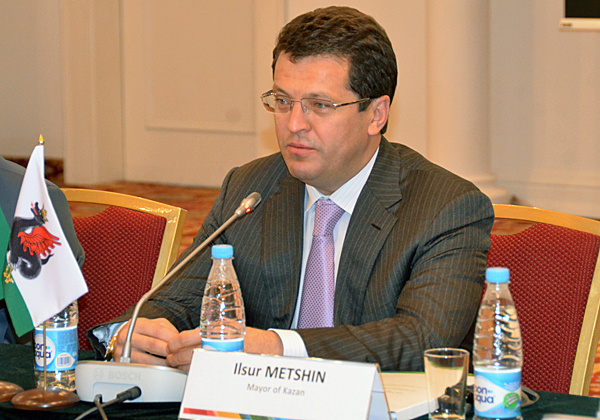 Kazan Mayor Ilsur Metshin
Kazan Mayor Ilsur Metshin
The meeting started with a welcome by Ilsur Metshin, the Mayor of Kazan who gave an emotional speech thanking the FISU board for attributing the Universiade to the capital of the Republic of Tatarstan. ‘Thank you for the trust you gave us five years ago. You have seen with your own eyes how the city and our people have changed, not only the sportsmen and women but also the volunteers and the citizens of Kazan. We have truly become an international city. I am sad knowing that in two weeks the 27th Summer Universiade will have become history, the road of preparation being very fulfilling, but I’m also grateful that we have accomplished everything together with FISU. I will always welcome you any time in Kazan. You have changed the city of Kazan and the Republic of Tatarstan! I wish for a successful Universiade and hope the fire of the student games will stay in our hearts forever.’
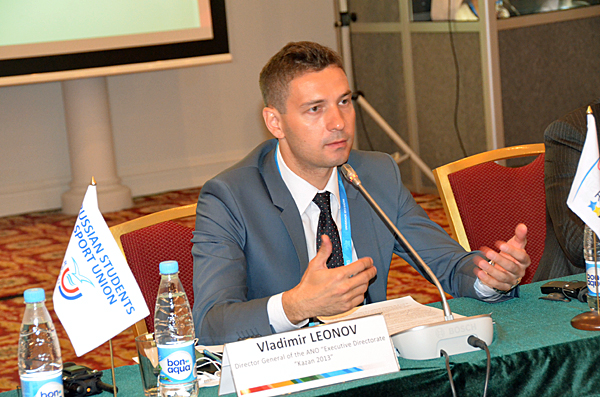 Kazan OC Director-General Vladimir Leonov
Kazan OC Director-General Vladimir Leonov
After the Mayor’s welcome Vladimir Leonov, Director-General of the Kazan OC took the floor introducing the video clip ‘The Five Years’ which visualised the five year period of preparations from attribution to delivery of the venues ready to host the Games. After the viewing, the Director-General summed up the recent realizations with a final update of the preparations.
Over 5,000 directorate staff members are engaged in the Games while a huge responsibility also rests on the 20,000 volunteers from 37 regions of Russia and 145 volunteers from 25 countries. As of June 29th, participation entries were submitted by 13,348 people (9,373 athletes & 3,975 officials) from 162 countries. While yesterday the Universiade Village was officially opened, the first participating delegations have already arrived. The Athletes’ Village has room for 14,592 people.
Vast resources were involved to provide qualitative medical care for the participants and guests of the Games. The Medical Centre of the Universiade Village will render 24/7 medical care to the members of the delegations, volunteers, staff and FISU Family.
The sport infrastructure of the Universiade includes 49 venues among which there are 33 competition and 16 training venues. The finals will be held at 22 sport venues. A total number of 40 sport venues and 3 non-sport venues were involved in the Universiade Rehearsals and over 170 services were tested.
Judging and refereeing services will be provided by 2,296 officials.
The Opening Ceremony will be held on July 6th at 21h30 and the Closing ceremony on July 17th at 22h00. More than 1,200 performers from Kazan and 200 performers from other cities of Russia will be involved in these ceremonies.
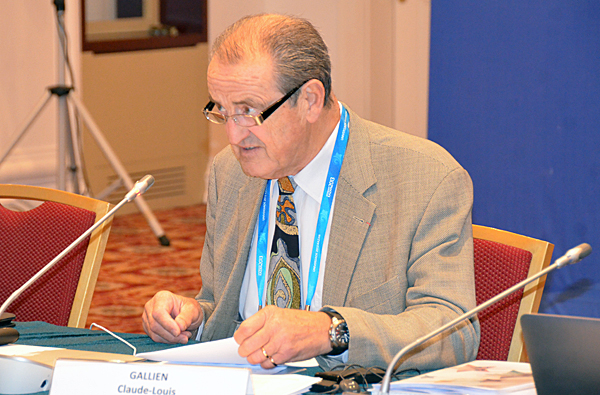 FISU President Claude-Louis Gallien
FISU President Claude-Louis Gallien
A large scale event such as the Universiade is of a great interest for national and international media. A total of 1,294 journalists is accredited for the Universiade. The Main Media Centre has been set up in the newly built Kazan Arena stadium with a capacity of 1,200 people and 30 press centres are at the competition venues, Universiade Park and Main International Centre. The International Broadcasting Centre also started its operation. Live coverage of the Universiade will be provided by 13 international and 3 Russian television companies (VGTRK, Channel One & TNV). Live sessions from 16 venues will be conducted with the help of OB vans. Competitions in the following five venues – rifle and pistol shooting, field hockey, fencing, chess and table tennis – will be broadcasted by ING cameras. Over 200 hours of live broadcasting will be provided for the TV channels in the Russian Federation. For international channels over 400 hours are planned.
Taking in account the significance of the forthcoming event, the OC tried to create a special atmosphere for all the citizens of Kazan and its international visitors. So the organisers decided to coincide with the Games a great number of different festivals such as the ‘Sabantuy’, a typical Tatar Cultural Festival that will take place on July 13th. Everyday (July 7th-17th), Cirque du Soleil will perform from 22h00 to 23h00 for the Universiade participants. In other words, the Universiade Park will become the main cultural platform during the Games.
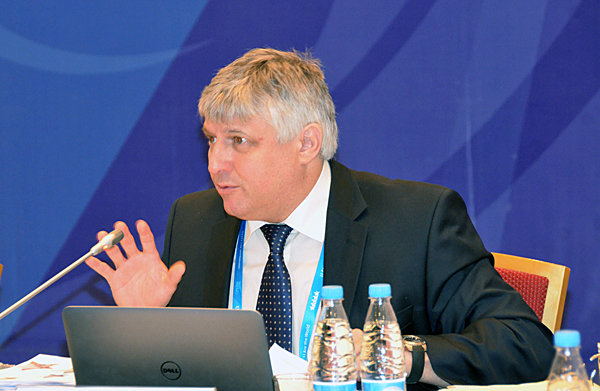 FISU SG/CEO Eric Saintrond
FISU SG/CEO Eric Saintrond
In conclusion, Vladimir Leonov expressed the gratitude of the OC for FISU’s support in helping them stage the historical Kazan Universiade Torch Relay. The Universiade flame has covered 42,500 km and visited the five continents. On Russian soil the flame travelled more than 30,000 km and has been in the 30 largest Russian student cities. At this moment, the Torch Relay is on the territory of Tatarstan. The relay will end on July 6th on the day of the Opening Ceremony. A symbolic 2,013 torch bearers will have carried the torch.
Mr. Leonov ended his report with a video of the torch relay stating that with the Kazan Universiade, Russia is starting an era of big sporting events (Winter Olympics, FINA Worlds, FIFA Worlds, IIHF Worlds etc.). ‘The attention will be focused on Kazan’, Leonov said. We will deliver.’
After the Kazan presentation, FISU President Claude-Louis Gallien presented his report in which he reviewed the biennale action plan and strategic review.
His report was followed by that of Secretary-General/CEO Eric Saintrond explaining the changes in the FISU and FIDSU administrations announcing the growth of staff from 27 to 38. Mr. Saintrond also announced four new membership applications, i.e. Niger, Suriname, Bahamas and Trinidad & Tobago. These were approved by the FISU Board to be presented at the General Assembly (July 3rd & 4th).
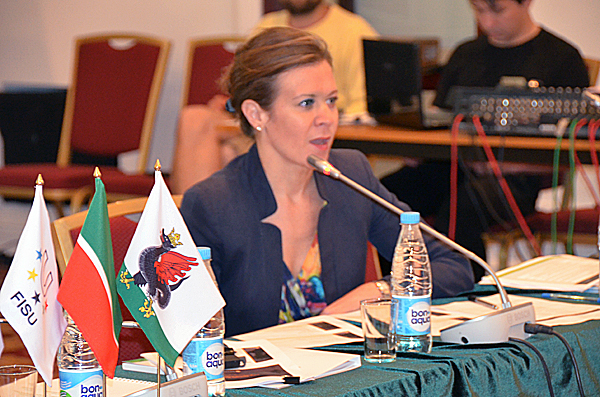 FISU Marketing Director Vanessa Aiello
FISU Marketing Director Vanessa Aiello
Marketing Director Vanessa Aiello gave an overview of the strategic review and the research that will be executed within the delegations participating at the Universiade in Kazan. She also gave an update of the marketing activities since the last EC meeting.
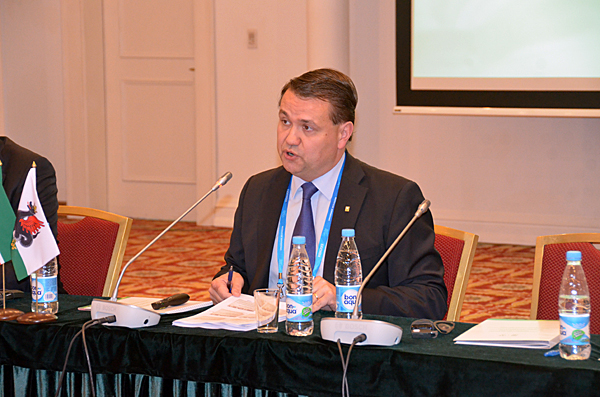 Stefan Bergh, Président de la CDSU
Stefan Bergh, Président de la CDSU
After the lunch break, Stefan Bergh, Chair of the Development Committee (CDSU) together with Laurent Briel, Director of Development informed the FISU Board on the latest activities of the committee, confirming that 73 countries will benefit from the help programme which has been set up in the frame of the 2013 Summer Universiade, i.e. Africa: 31 countries; Americas: 22 countries; Asia: 9 countries; Oceania: 6 countries and Europe: 5 countries. Mr. Bergh also mentioned the FISU survey which is a product of the CDSU and EduC (Student Committee), and it aims at collecting data and giving a full screening of our NUSFs. This survey was launched among the FISU NUSF member associations in order to better know them, identify them, and understand their way of functioning, but mostly to establish a closer collaboration in order to have a clear view of their needs and aspirations.
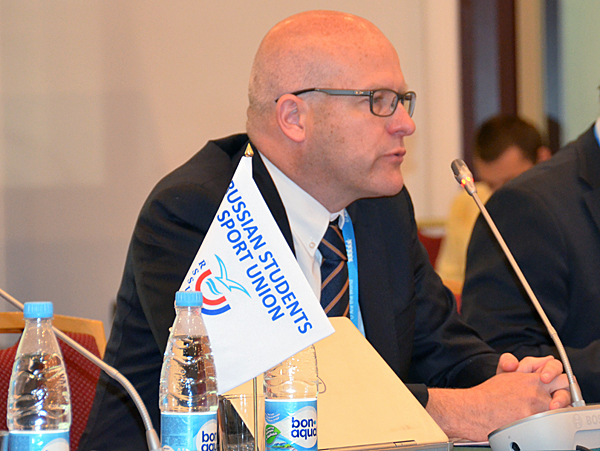 Laurent Briel, Director of Development
Laurent Briel, Director of Development
Alison Odell, Chair of the Education Committee reported on the latest activities of the committee. Mrs. Odell gave an update of the upcoming 2014 FISU Forum in Gwangju and informed that two bids for the 2016 edition were received, from Salvador, Brazil and Montpelier, France. The CESU Chair was pleased with the preparation and venue for the upcoming FISU Conference (July 14th-17th) and is looking forward towards the upcoming Winter Conference during the 2013 Winter Universiade in Trentino this December, which will be cutting edge.
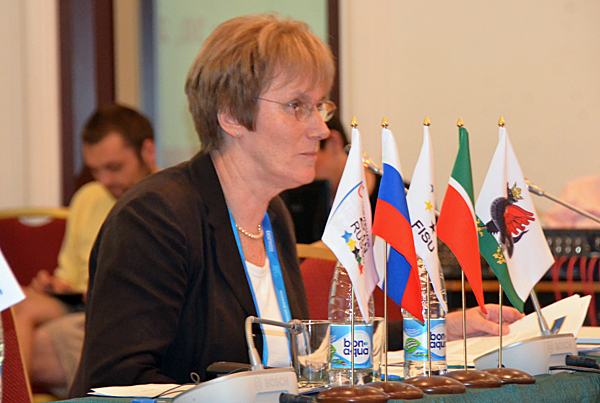 Alison Odell, CESU Chair
Alison Odell, CESU Chair
Mrs. Odell also looked back at the successful Rectors Forum hosted in Umea, Sweden this June giving her colleagues some food for thought regarding the name and format of the future editions of the FISU Rectors’ Forum. She also referred to FISU’s presence at International Conferences, like the IOC Conference on Sport for All and the intergovernmental conference MINEPS in Berlin.
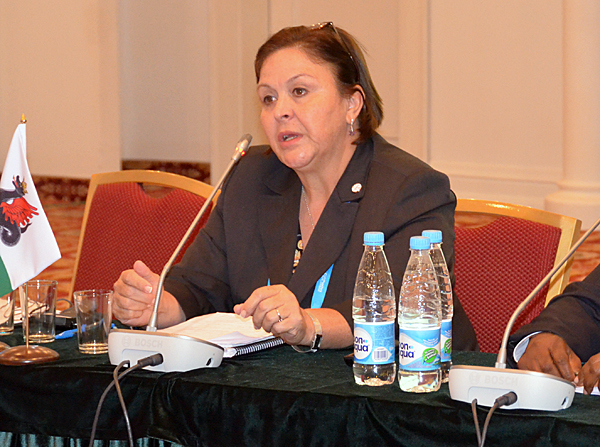 Rosaura Mendez, GEC Chair
Rosaura Mendez, GEC Chair
Mrs. Odell mentioned the co-operation and partnership with CDSU regarding the FISU-WADA program as part of the 2015 Gwangju Universiade Legacy project, an e-learning platform, as well as a possible mentoring programme to support young persons in the university sport movement achieve their potential in national and international leadership positions.
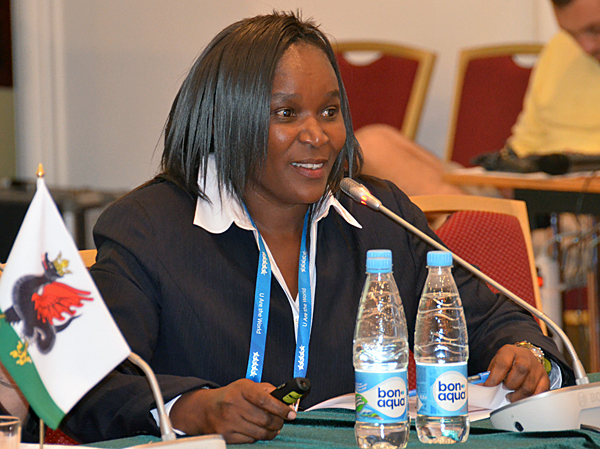 Penninah Kabenge, GEC Vice-Chair
Penninah Kabenge, GEC Vice-Chair
The FISU Board approved that the FISU Rectors Forum be reviewed and renamed, redesigned and redefined for onward use in 2016 and beyond and that FISU will use the Berlin Declaration 2013 as guidance to inform its understanding and policy development within its education and sporting arenas going forward. The Board also approved to proceed with further development of the Mentoring Programme in conjunction with the GwangJu OC as part of the Legacy programme. The 2016 Forum was attributed to Montpellier.
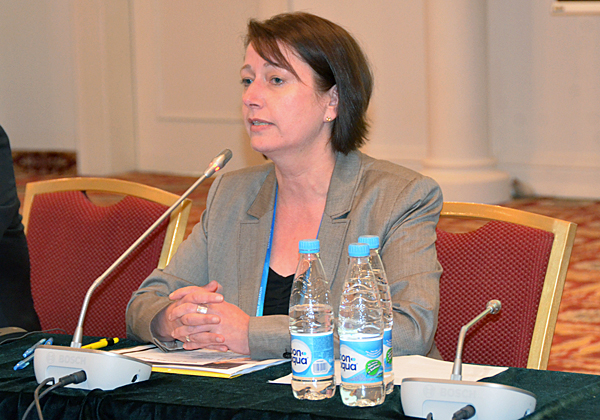 Verena Burk, Media & Communication Committee Chair
Verena Burk, Media & Communication Committee Chair
After the coffee break, the floor was giving to the Gender Equality Committee represented by Chair Rosaura Mendez and Vice-Chair Penninah Kabenge. The presenters gave feedback on the 3rd FISU Gender Equality Sport Award, for which 14 high quality nominations were received from 10 countries. The aim of the award is to promote and encourage the higher integration of women in sport at all levels. The Award proposal was for an existing project developed by a Federation, an Organization, an Institution, or an Individual. Special attention was given to projects that could act as models for others while the winner will be announced during the General Assembly. The Gender Equality Committee will meet on July 15th. To continue the development approaches initiated by the previous committee a 2nd Round Table is scheduled for July 16th with some high-profile guests such as: Dr. Elida Alfaro (ESP), European Institute for Gender Equality; Mrs. Raija Mattila (FIN), Co-Chair of IWG; Mrs. Marisol Casado (ESP), ITU President; Ms. Helen Searle (AUS), IKF President’s Special Delegate for Equal Opportunity and Ms. Anita DeFrantz (USA); Chair of the IOC Women’s Committee.
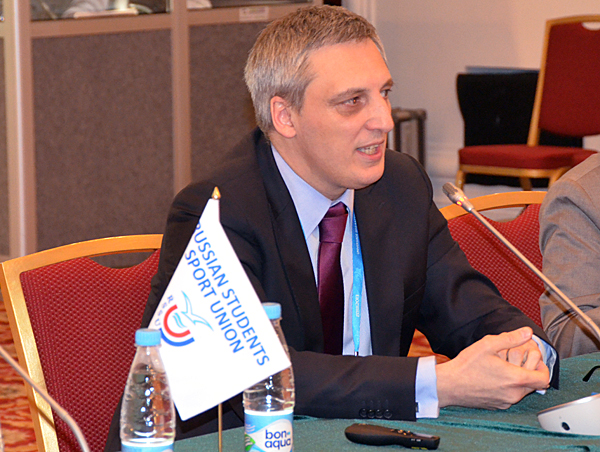 Dejan Susovic, Media & Communication Director
Dejan Susovic, Media & Communication Director
Next, the floor was given to Verena Burk, Chair of the Media & Communication Committee who explained the set-up of the 2nd FISU Young Reporters’ Programme which will take place during the Universiade. Dejan Susovic, Media & Communication Director gave an overview of the media activities during the Universiade. 23 sports will be broadcast live internationally and domestically. There will be more than 750 hours of TV production, daily highlights (2x26min), 4 simultaneous world feeds and unilateral production for Russian TV stations. Mr. Susovic confirmed a wide spectrum of FISU TV Partners, such as Eurosport (+125hrs), ESPNU & ESPN3 (+150hrs combined); Asian-Pacific Broadcasting Union representing more than 40 countries in Asia and the Pacific, KBS Korea; Kazakhstan national TV, Ukranian TV, Czech TV, FUJI TV, TV Asahi, ARD/ZDF, TV Globo…
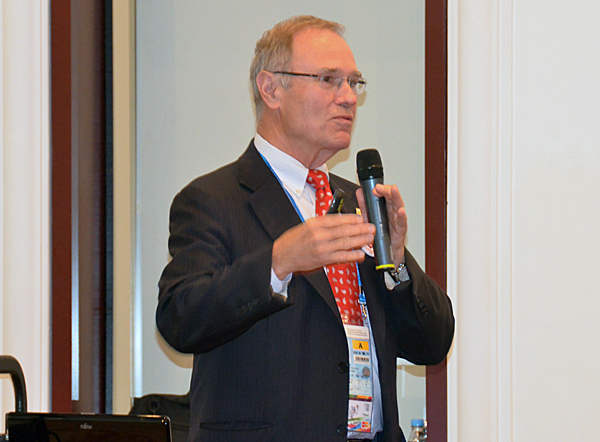 Dr. Larry Rink, Chair Medical Committee
Dr. Larry Rink, Chair Medical Committee
The day ended with an update of the medical services at the games and activities of the Medical Committee presented by Dr. Larry Rink, the MC Chair. 900 in-competition doping tests will be made. Beside these tests blood tests and EPO-tests as well as human growth hormone testing will be conducted, all firsts for the Universiade. Dr. Rink confirmed the highest quality of the medical facilities with more than 2,000 medical staff available. Dr. Rink also mentioned the ‘Hearth Project’, a cooperative venture between FISU, the Minister of Health of Tatarstan, Kazan State Medical University, Advanced Medical Technology and the Local Organizing Committee. Project Advisor for Publication of Research will be ACC and the Indiana University Department of Cardiology. The programme is free and available to all athletes of the Universiade to have a check-up of their heart.
C. Pierre, Press Officer
